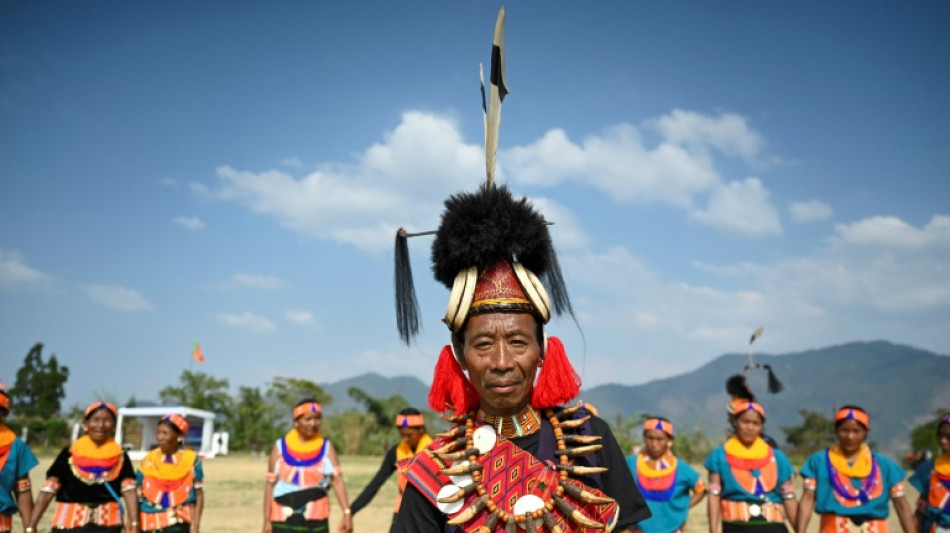
-
 Arsenal stroll in Women's Champions League play-offs
Arsenal stroll in Women's Champions League play-offs
-
Milei labor law reforms spark clashes in Buenos Aires

-
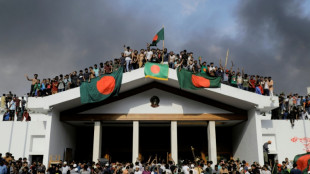 Bangladesh's political crossroads: an election guide
Bangladesh's political crossroads: an election guide
-
Bangladesh votes in landmark polls after deadly uprising

-
 US stocks move sideways after January job growth tops estimates
US stocks move sideways after January job growth tops estimates
-
Man City close in on Arsenal with Fulham cruise

-
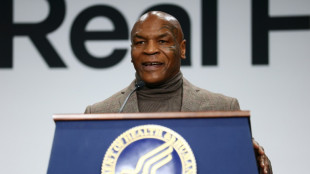 Mike Tyson, healthy eating advocate for Trump administration
Mike Tyson, healthy eating advocate for Trump administration
-
LA 2028 Olympics backs chief Wasserman amid Epstein uproar

-
 Brighton's Milner equals Premier League appearance record
Brighton's Milner equals Premier League appearance record
-
Seahawks celebrate Super Bowl win with title parade

-
 James Van Der Beek, star of 'Dawson's Creek,' dies at 48
James Van Der Beek, star of 'Dawson's Creek,' dies at 48
-
Scotty James tops Olympic halfpipe qualifiers as he chases elusive gold

-
 Swiatek, Rybakina fight back to reach Qatar Open quarter-finals
Swiatek, Rybakina fight back to reach Qatar Open quarter-finals
-
Trump tells Israel's Netanyahu Iran talks must continue

-
 England to face New Zealand and Costa Rica in pre-World Cup friendlies
England to face New Zealand and Costa Rica in pre-World Cup friendlies
-
'Disgrace to Africa': Students turn on government over Dakar university violence
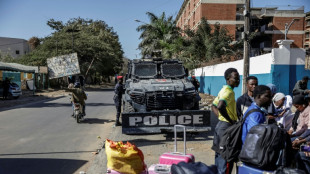
-
 Simon in credit as controversial biathlete wins Olympic gold
Simon in credit as controversial biathlete wins Olympic gold
-
McIlroy confident ahead of Pebble Beach title defense

-
 US top official in Venezuela for oil talks after leader's ouster
US top official in Venezuela for oil talks after leader's ouster
-
Ukraine will only hold elections after ceasefire, Zelensky says

-
 WHO urges US to share Covid origins intel
WHO urges US to share Covid origins intel
-
TotalEnergies can do without Russian gas: CEO

-
 Instagram CEO denies addiction claims in landmark US trial
Instagram CEO denies addiction claims in landmark US trial
-
Israel's Netanyahu pushes Trump on Iran

-
 EU leaders push rival fixes to reverse bloc's 'decline'
EU leaders push rival fixes to reverse bloc's 'decline'
-
BMW recalls hundreds of thousands of cars over fire risk

-
 Norris quickest in Bahrain as Hamilton calls for 'equal playing field'
Norris quickest in Bahrain as Hamilton calls for 'equal playing field'
-
Colombia election favorite vows US-backed strikes on narco camps

-
 French court to rule on July 7 in Marine Le Pen appeal trial
French court to rule on July 7 in Marine Le Pen appeal trial
-
Jones says England clash 'perfect game' for faltering Scotland

-
 Norway's ex-diplomat seen as key cog in Epstein affair
Norway's ex-diplomat seen as key cog in Epstein affair
-
Swiatek fights back to reach Qatar Open quarter-finals

-
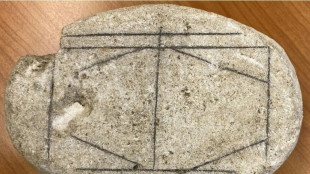 AI cracks Roman-era board game
AI cracks Roman-era board game
-
Motie spins West Indies to victory over England at World Cup

-
 NBA bans 4 from Pistons-Hornets brawl, Stewart for 7 games
NBA bans 4 from Pistons-Hornets brawl, Stewart for 7 games
-
Shakira to rock Rio's Copacabana beach with free concert

-
 Cyclone batters Madagascar's second city, killing 31
Cyclone batters Madagascar's second city, killing 31
-
Stocks spin wheels despite upbeat US jobs data

-
 Arsenal boss Arteta lauds 'extraordinary' Frank after Spurs axe
Arsenal boss Arteta lauds 'extraordinary' Frank after Spurs axe
-
New drones provide first-person thrill to Olympic coverage

-
 Instagram CEO to testify at social media addiction trial
Instagram CEO to testify at social media addiction trial
-
Deadly mass shooting in Canada: What we know

-
 NATO launches 'Arctic Sentry' mission after Greenland crisis
NATO launches 'Arctic Sentry' mission after Greenland crisis
-
Israel's Netanyahu at White House to push Trump on Iran

-
 Canada stunned by deadliest school shooting in decades
Canada stunned by deadliest school shooting in decades
-
US lawmakers grill attorney general over Epstein file release

-
 Cyclone kills 20 in Madagascar as 2nd-largest city '75% destroyed'
Cyclone kills 20 in Madagascar as 2nd-largest city '75% destroyed'
-
French court rejects bid to reopen probe into black man's death in custody

-
 French rape survivor Gisele Pelicot reveals pain, resilience in memoirs
French rape survivor Gisele Pelicot reveals pain, resilience in memoirs
-
xAI sees key staff exits, Musk promises moon factories


India's headhunter warriors sever past, fret over future
Once, the way to get ahead among India's Konyak warriors was by chopping off an enemy's skull. Today, the last survivors of a past age mourn the changing times -- and a new generation they see as soft.
At 90, Nokkho Konyak can barely see beyond a few feet, his facial tattoos marking him as a warrior are fading and his frail body needs support.
But his eyes light up and his hands become animated when he talks about "those simpler times".
"We witnessed our brave elders cutting off enemies' heads and participated in many battles," he told AFP.
Nokkho is a Konyak, a small but fierce and respected warrior community in northeastern India's Nagaland state.
The Konyaks were the last to give up the age-old practice of severing enemies' heads in this remote, hilly and densely forested region close to the Myanmar border.
"I am lucky to still be alive, to be around my extended family, and I feel that today's generation is too privileged," he said at Chi village, about 360 kilometres (225 miles) from the regional capital Dimapur.
- 'Heads were trophies' -
Nokkho is an old man from a dying breed that practised or witnessed headhunting before it stopped half a century ago.
"Human heads were trophies that earned you respect," he said, sitting in front of a wall decorated with the skulls of animals sacrificed by his family.
Warriors were inked with different tattoos signifying anything from participation in a battle to killing someone and actually taking a head.
As a young boy, he practised lopping off heads on large puppets, though he never severed a human one in battle himself.
The last two headhunters in the village, his two elderly friends, died about 20 years ago.
Most tribal fights happened over land and limited resources, with warriors carrying spears, axes and machetes ambushing their enemies.
Wherever possible, enemies' headless bodies were tied to a bamboo pole and taken back to the victor's village.
The head itself was taken and paraded about for the village to see, hailed as a sign of bravery to be celebrated.
"My youth was a time of great transition," Nokkho said, referring to the arrival of missionaries, who denounced headhunting and gradually converted most people from their traditional animist beliefs to Christianity.
Nokkho remembers World War II, the end of British colonial rule, the formation of the Indian state in 1947, the first roads and power lines, and now, finally, the arrival of mobile phones.
- 'Hard for women' -
Like Nokkho, 90-year-old Bo Wang, king of nearby Hongphoi village, took up hunting wild boars and other animals after "headhunting became taboo".
Wang's family, like other royals in nearby Konyak villages, has been the final local authority for generations.
"Everyone lived in fear of an ambush, and we were taught to be wary of everyone," Wang said, describing the stress of growing up with the threat of headhunters.
The area is peaceful now, he said, but he laments what he sees as a lost era.
"Everything changed with modernity, our culture is dying," he said.
"People respected hierarchy, elders and their king -- which isn't the case anymore," he added.
Dressed in a traditional red conical cap adorned with fluttering feathers and boar tusks, he sat around a fire with his peers reminiscing, saying they hoped their stories, lives and culture would not be forgotten.
But Wang's second wife, Kamya, 80, said she was glad her granddaughters were growing up today and not in the conditions she experienced.
"There was just stress, not enough food or resources," she told AFP. "It was particularly hard for women, who thanklessly worked at home, in the fields -- all the time".
Kaipa Konyak, 34, from a local tribal organisation working to support the Konyak culture, said that the history would not be lost.
"Young people are proud of their warrior traditions and culture," he said.
"We remember our roots and will strive to protect them while also securing our future with the best modern education and infrastructure."
R.Halabi--SF-PST


